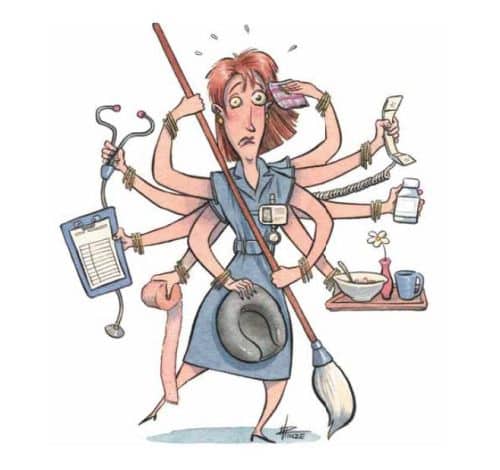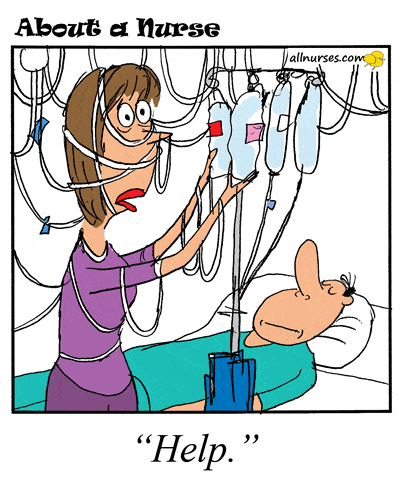Calling all nurses! Just a quick game. Are you ready? Close your eyes. Now open them because you won’t be able to read what’s next. Okay, let’s do this.
Think of a colleague. The one who is always running around the vicinity, holding all the charts he can carry, going back and forth and busy attending a patient. A patient who keeps pressing the call bell like a buzzer in a noontime show. Tell me, did someone enter your mind? Of course! What do we call them? The “toxic” nurse!
I bet we’ll both say that. We always have one in the area, right? Now where did that expression come from? The expression “toxic” nurse may have started way back since Nightingale learned how to light the lamp. Really? No, just kidding. There is no known origin of this expression and to why we use that to indicate someone who is always preoccupied even in a usually benign area. The word “toxic” refers to a colloquial term to fitly describe an “always busy nurse.” In the nursing world, he can be someone who seemed to attract numerous patients for admission, or the one who handles critical or dying patients. And if an area becomes busy just because he is on-duty, he would receive suspicious glaring. How stressful right?
Some say being a toxic nurse is having bad luck, it’s not easy being a nurse, after all. I say this is just a matter of coincidence and bad luck, but there is one more factor: the ability to adapt and manage the work. If you’re a toxic nurse, then you need to read this. If you don’t want to become one, all the more you need to know this. Because if you wish to avoid being toxic, know one.
So if you are decided, here are ways to be a successful toxic nurse:
1. Toxic nurses always say “Yes!”
If you want to be tagged as the Saint Nurse or died and canonized to be one due to toxicity, then go ahead, record “Yes” and play it whenever someone asks you a favor. I know it’s hard to say “No.” You might think it’s rude, will offend someone, or they just might get the wrong idea. But the thing is, overcommitment is also a disease. It makes you weak in the process. It makes your priority tasks difficult to achieve in an eight-hour shift.

If you already have too much to do, politely decline a request. You can even say, “I’ll make it up some other time.” It doesn’t hurt much to say “no.” Saying ‘yes’ too often hurts more. Have your self-worth. Saying “No.” can make you feel in control, thus managing your task well becomes easier. Have the self-confidence, practice in front of the mirror if you want. You will gradually feel empowered and confident.
Toxic nurses tend to be confused by a variety of things, so don’t add up any more responsibility. Prioritize yourself and your capacity to give adequate nursing care. Your patients must come first, and your decision-making skills will matter at this point. As they say, talk now or forever hold your grudge.
2. Think negative.
You read it right. Stay that way and you will attract all kinds of dilemma, making you toxic all the way. Have you heard the quote, “Mind over matter”? Michael Brown, a New Zealand author, wrote in his novel, Finding the Field: an adventure of body, mind, and spirit: “You choose your lanes in every second of your waking life—with your thoughts. Your thoughts accumulate and become strong beliefs, the most powerful operating at subconscious levels and affecting your next choice. Little wonder that when something unpleasant happens, we think life has done it to us’.”
So based on that, there is no such thing as coincidence, all are based on our subconscious choices. As quoted, “What you think, you become. What you feel, you attract. What you imagine, you create.” So if you think you’ll probably have many admissions, you’re likely to have that. You blame yourself eventually affecting your performance. You will then be the ‘toxic nurse’ who attracts admissions. Do you want that? Think negative.
3. Leave your watch at home.
Imagine a scenario. You don’t have a watch to track time while working. You helped a colleague and had some chit chat time for a while. What should have been a short while became your longest hour. You failed to administer your medications on time and did not yet document the procedures done. There was an over-infusion of IV. As a result, you have too much to rush in a short amount of time. The result? Toxic. See how important tracking time is? Wear a watch, even the cheapest one, it has the same purpose anyway.
4. Never ask for help. Because you can do it yourself, right?
“Don’t be shy about asking for help. It doesn’t mean you’re weak, it only means you’re wise,” says a quote. Nurses, remember, we have the same job and purpose, of helping and taking care of patients. If you don’t seek help, eventually you’ll be joining your patients and be one as a result of burnout. Learn to ask a favor and give one in return. Even a toxic nurse appreciates a company once in a while. No man is an island, but if you want to have high toxic levels, be an island.

Learn to ask a favor and give one in return. Even a toxic nurse appreciates a company once in a while. No man is an island, but if you want to have high toxic levels, be an island.
5. Do not communicate with your patient.
Do you know the secret behind patients or family members making call bells their best friend? Most probably communication. It’s either you’re too busy attending other tasks so you don’t have time to talk to your patient regarding his needs or your needs. Who can tolerate patients who press the call bell every five seconds? It’s tiring, irritating and can be a waste of time. So explain to a demanding patient the procedures to be done during your shift. A brief explanation can set expectations because patients can understand, you know. You might be surprised on how much this will cause a difference. Don’t be a toxic nurse going back and forth to the same patient. What’s the first step in the nursing process? Build rapport or build toxicity? Choose what you like.
6. Go on duty unprepared.
A toxic nurse has a failure of cognitive processes and focus. Ever wonder why shifting schedules usually take the time to rotate? A well-toned circadian rhythm is essential. Sleep plays a critical role in thinking and learning, so the lack of sleep impairs attention, alertness, concentration, reasoning, and problem solving. This makes it harder to learn efficiently. The result? Toxic nurse.

Furthermore, various sleep cycles play a role in consolidating memories in the mind. If you don’t get enough sleep, there’s a big chance that you won’t be able to remember what you learned and experienced during the day. So rest while you can and eat a nutritious meal. Exercise can help. Being ready makes you steady.
7. Do shortcuts.
When I say shortcuts, it means getting things rushed and skipping a few steps to a procedure. For an instance, you have two patients with different oral medications. To save time, you brought two medications at a time and administer to patient one without checking the tags and did the same with patient two. Later on, you discovered that both have the same names, and you interchanged the medication. What a terrible coincidence, right? Remember, even Nursing is a process. There is no shortcut to safety. Nurses deal with lives here.
The thing is to keep the main thing, the MAIN thing. The best way is to plan ahead at the beginning of the shift and do as planned. But if you insist, you can as well face the consequences of being toxic.
Did you know that nurses from the different departments have different unique nicknames for a toxic nurse? One female toxic nurse thought she must be “Nurse Kevorkian” from the “Doctor of Death” since the first time she worked at a Long Term Care unit, nine of her patients died, several were just because of flu. Some aides call her the “Angel of Death” and it was an awful experience for her. Another one was called as “Sh*t Magnet,” since, you know, she attracts that kind of things. In an Emergency Department, a toxic nurse is a “Dark Cloud,” who is often distressed, but also admired. Since she handles the difficult cases and become very experienced in gaining knowledge throughout the process, this became her greatest asset—her learning experience. Another nurse even called a ‘toxic’ nurse as a “Bad Moon” regardless of the actual lunar cycle. Oh well, nurses have humor after all.
Indeed, toxicity in the nursing world is an acceptable phenomenon. We can never remove that in our system. Bad luck and coincidence may or may not be the cause. But one thing’s for sure, we can do something about it. Now that you know how to be a toxic nurse, you are a level above others. Kindly do the opposite.
